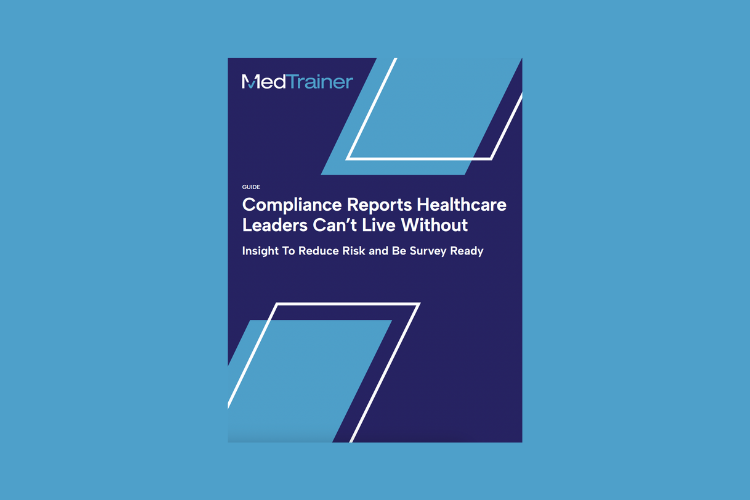In 2024 alone, Centers for Medicare and Medicaid (CMS) accrediting agencies completed nearly 3,000 surveys at U.S. hospitals. Being CMS survey-ready needs to be a priority at any facility subject to these inspections. The most common citations are related to patient’s rights, with care in a safe setting topping the list for both 2023 and 2024.
Use this article as a checklist to prepare for a Centers for Medicare & Medicaid Services survey. I’ve also included tips on how to set up your compliance reports to match the requirements so you’re always CMS survey-ready.
Checklist: What Can My Team Do To Prepare for a CMS Inspection?
Responsible healthcare organizations don’t procrastinate on proactively preparing for a survey. Waiting until the day of an inspection to get things together is just too risky. There are a number of steps you and your team can take well in advance to prepare for a CMS inspection and reduce audit anxiety.
Understand CMS Requirements. The first step in preparing to be CMS survey-ready is to thoroughly understand the scope of a CMS inspection. These regulations cover a wide range of areas, including patient care, infection control, medical records, staff training, and more. Familiarize yourself with the regulations that pertain to your type of healthcare facility to ensure compliance.
Designate an Inspection Team. Appoint a dedicated team responsible for coordinating the inspection preparations. This team should include individuals from various departments, such as administration, nursing, quality assurance, and compliance. Assign clear roles and responsibilities to each team member to ensure a well-organized and thorough preparation process.
Conduct Regular Internal Audits. Regular internal audits or mock inspections can help identify potential areas of non-compliance before the CMS inspection. Review policies, procedures, and practices to ensure they align with CMS requirements. Address any issues discovered during the audit promptly and create an action plan for improvement.
Review Policies and Procedures. Thoroughly review and update your facility’s policies and procedures to ensure they reflect current CMS guidelines. Make sure all staff members are aware of the changes and are trained to follow the updated protocols.
Track Staff Education. Properly trained and educated staff play a critical role in ensuring compliance and providing quality patient care. Conduct regular training sessions to ensure that all employees are aware of CMS requirements, policies, and procedures. Keep records of training sessions as they may be requested during the inspection.
Focus on Common Citation Areas. Patient rights and infection control are significant focuses of CMS inspections because they are among the most cited. Review your facility’s infection control plan and patient grievance policy, then ask a few employees about these documents – just like a surveyor would. If the responses you get don’t match policy, consider adding additional training on these topics. Use this guide for developing an effective infection control plan.
Leverage Modern Technology. Consider taking advantage of a software solution that houses and accelerates your organization’s healthcare compliance management in a user-friendly platform. Modern technology can drastically simplify your processes, save your organization time, identify areas for improvements, and reduce costs incurred by upkeeping time-consuming manual processes.
Prepare Reports. Efficient compliance tracking and reporting is crucial to be ready for a CMS inspection. Ensure that patient records, policies, training records, incident reports, and other relevant documents are complete, up to date, and easily accessible.
Are You CMS Survey-Ready?
A healthcare inspector for CMS will be looking both for written proof demonstrating compliance, as well as in employee actions. The written proof is usually a much easier ask – especially when you set up your reports to reflect the requirements and information that the surveyor will want to see.
Here are tips for ensuring your reports are ready to meet the requirements.
- Training. Typically surveyors will want to see employee name, course name, length, and proof of completion. Any additional information that illustrates your company’s staff training and educational achievements may also be included.
- Incidents. It’s usually a pretty comprehensive report to track your incidents – be sure you’ve got the status, resolution, incident and resolution dates, and type of incident easily accessible. You may want to create separate reports for patient grievances and infection control incidents so that you can share more detailed information.
- Policies. Surveyors will want to see the date of the last policy revision as well as approval from leadership and/or the board of directors. If your report links directly to each policy, it is much simpler for the surveyor to see everything needed.
- Credentialing. The surveyor will likely pick an employee and document at random, so having everything in a credentialing platform is ideal. A report will offer quick confirmation that you have the document in question and that it is still valid.
- Exclusions. An exclusions report should include the date the exclusion was checked, the website used for verification, the date of the report, and the employee’s identifying information.
- Licenses. A report of license expiration dates is probably the most handy before a survey so you can ensure every clinician is current.

The best compliance and credentialing reports to surface critical insights and keep you survey ready.
Simplify Your CMS Inspection Preparations
Being CMS survey-ready requires thorough planning, diligent adherence to regulations, and a collaborative effort from your entire healthcare facility. By understanding the requirements, conducting regular internal audits, implementing robust preparation strategies, and building the right reports, you can work towards a successful inspection that demonstrates your commitment to patient safety and high-quality care.
An easy-to-use, cloud-based platform like MedTrainer can support your compliance strategy and help you to maintain survey readiness. A robust course library, automated training reminders, customizable reporting features, credentialing services with primary source verification and exclusions monitoring, safety plan templates, incident report forms, and more, are all options within the nation’s leading all-in-one healthcare compliance software solution. Learn more about MedTrainer’s tools for preparing for an inspection.
